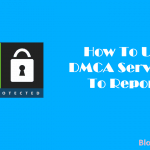When we think about blogging, we think about creativity, being original and unique, right? Well, it should be like that, but let’s face it — sometimes we have to deal with copycats. If you can relate to this, then stick with us.
We’ve prepared this article to teach you how you can deal with blog plagiarism.
Let’s start by figuring out the motif and reason why there are so many people just copying the works of others. First one, the most obvious, is the fact that the Internet is open to everyone.
Some people aren’t as hard working as others, and they don’t want to do the work by themselves. Therefore, they just copy other people’s ideas and present them as their own.
Another reason is the fact that they are blogging solely for the purpose of making money.
And, don’t get us wrong — there’s nothing bad about wanting to earn some cash by running a blog.
However, the idea of stealing someone’s posts, image or content is way faster and easier than doing it on your own.
Now that we know that the copycats are just lazy and eager to earn no matter the cost, it’s high time we focused on tips on how to deal with them and protect our work.
Contents In Page
Taking Credit For Your Own Working Hours
If you enjoy blogging and put some effort into writing your blog posts, this should be a reason enough to protect your work.
The bottom line is — those are your hours and effort. Essentially, why would you let someone else get higher traffic thanks to you, without giving you credit for it?
Reporting Plagiarism
If you choose to trust Google search traffic-wise, Google will be able to detect a site that has copied your content.
However, this isn’t 100% accurate. In fact, there are some cases when it might not be able to trace the copied content. In that case, you would have to make sure to report such content.
Essentially, the vast majority of web services takes plagiarism as a serious offense. As such, once you report a theft to them through their DMCA page or spam report, they will take the copied content down immediately.
How Does Plagiarism Affect Your Blog SEO?
Luckily, when it comes to the search engine ranking, copied content isn’t likely to top the original post.
Thanks to the amazing search engine algorithms, any detected plagiarism will count as spam.
So, the likelihood of a copycat stealing your search engine ranking is quite low.
How To Spot Someone Stealing Your Content?
This one is not hard at all and won’t give you headaches (except when you find out that someone is, indeed, stealing your work).
There are plenty of ways to check whether someone has copied your content. We will describe two ways that we consider the most reliable and efficient on the web at the moment.
First, we’d like to talk about a tool called Copyscape. Essentially, what this tool does is help you determine whether your content is being used on any other website.
The only thing you need to do is paste your URL into it, and within seconds, you’ll find out whether there’s a reason to worry or not.
Another great way to detect plagiarism, even simpler than the previous one, is Google search. Just take a part of your content and paste it into the search bar.
If there is a site using your content, Google will let you know immediately.
How To Stop Them Once You’ve Spotted Them?
Being aware of plagiarism won’t make it go away. Therefore, you need to take some action. We recommend doing some digging on the website that shows copied content.
That way, you should be able to determine the site owner’s email address or other contact information.
In case you have their email, you can start by reaching out to them and letting them know that you’re aware of their illegal actions. In addition to that, you should explicitly request the credit for your work.
If they aren’t willing to give you credit, you should request immediate removal of your content.
However, if you cannot persuade them to take down your work, you need to take on a more aggressive approach.
1) Reach Out to Google
If the website owner is making a profit by illegally copying your content, you shouldn’t hesitate to reach out to Google.
In fact, if you report this action and present enough evidence, the article will be taken down from their website in no time.
2) Reach Out to Their Webhost
Another option is contacting the website’s hosting company. Basically, making the web-hosting company aware of the illegal activity of their client makes them directly involved in it.
That’s why they may take action and even proceed to remove the entire site.
There are many tools out there that can help you find out who’s hosting a particular website. So make sure you check that, too.
3) Reach Out to the Advertising Company
Finally, you also have the option to reach out to the advertising company, too.
Basically, the majority of advertising companies, such as Adsense, have pretty strict terms of service addressing literature theft.
So, you should consider making them aware of plagiarism as well.
Final Thoughts
Stealing someone’s wallet is an act of theft. And, stealing someone’s online work is the exact same thing. Let’s face it — copying isn’t blogging.
In fact, copying is just a lazy and lousy way of trying to make money.
We’re not saying that people shouldn’t share ideas and blog posts, but when they do, they need to give each other proper credit.
The magic of a successful and valuable blog lies in original content. So, make sure you are genuine and hard-working.
And, if you do spot someone stealing your work, make sure you deal with it accordingly. As we’ve shared earlier, there are many ways to find out whether you’re being copied and equally as many ways to protect your work.








